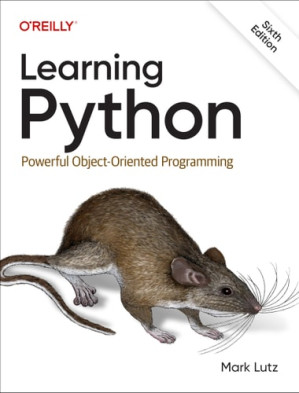English [en], .pdf, 🚀/zlib, 18.1MB, 📘 Book (non-fiction)
LEARNING PYTHON : powerful object-oriented programming 🔍
O'Reilly Media, Incorporated, 6, 2025
Mark Lutz, David Ascher 🔍
description
Get a comprehensive, in-depth introduction to the core Python language with this hands-on book. Based on author Mark Lutz's popular training course, this updated sixth edition will help you quickly write efficient, high-quality code with Python. It's an ideal way to begin, whether you're new to programming or a professional developer versed in other languages. Complete with quizzes, exercises, and helpful illustrations, this easy-to-follow self-paced tutorial gets you started with Python 3.12 and all other releases in use today. With a pragmatic focus on what you need to know, it also introduces some advanced language features that have become increasingly common in Python code. This book helps you: Explore Python's built-in object types such as strings, lists, dictionaries, and files Create and process objects with Python statements, and learn Python's syntax model Use functions and functional programming to avoid redundancy and maximize reuse Organize code into larger components with modules and packages Code robust programs with Python's exception handling and development tools Apply object-oriented programming and classes to make code customizable Survey advanced Python tools including decorators, descriptors, and metaclasses Write idiomatic Python code that runs portably across a wide variety of platforms
Alternative edition
United States, United States of America
Alternative edition
October 1, 2007
Alternative edition
S.l
Alternative description
Describes the features of the Python 2.5 programming language, covering such topics as types and operations, statements and syntax, functions, modules, classes and OOP, and exceptions and tools.
date open sourced
2025-03-03
🚀 Fast downloads
Become a member to support the long-term preservation of books, papers, and more. To show our gratitude for your support, you get fast downloads. ❤️
- Option #1: Fast Partner Server #1 (recommended) (open in viewer) (no redirect) (short filename) (no browser verification or waitlists)
- Option #2: Fast Partner Server #2 (open in viewer) (no redirect) (short filename)
- Option #3: Fast Partner Server #3 (open in viewer) (no redirect) (short filename)
- Option #4: Fast Partner Server #4 (open in viewer) (no redirect) (short filename)
- Option #5: Fast Partner Server #5 (open in viewer) (no redirect) (short filename)
- Option #6: Fast Partner Server #6 (open in viewer) (no redirect) (short filename)
🐢 Slow downloads
From trusted partners. More information in the FAQ. (might require browser verification — unlimited downloads!)
- Option #1: Slow Partner Server #1 (slightly faster but with waitlist)
- Option #2: Slow Partner Server #2 (slightly faster but with waitlist)
- Option #3: Slow Partner Server #3 (no waitlist, but can be very slow)
- After downloading: Open in our viewer
External downloads
All download options have the same file, and should be safe to use. That said, always be cautious when downloading files from the internet, especially from sites external to Anna’s Archive. For example, be sure to keep your devices updated.
-
For large files, we recommend using a download manager to prevent interruptions.
Recommended download managers: JDownloader -
You will need an ebook or PDF reader to open the file, depending on the file format.
Recommended ebook readers: Anna’s Archive online viewer, ReadEra, and Calibre -
Use online tools to convert between formats.
Recommended conversion tools: CloudConvert -
You can send both PDF and EPUB files to your Kindle or Kobo eReader.
Recommended tools: Amazon‘s “Send to Kindle” and djazz‘s “Send to Kobo/Kindle” -
Support authors and libraries
✍️ If you like this and can afford it, consider buying the original, or supporting the authors directly.
📚 If this is available at your local library, consider borrowing it for free there.
Total downloads:
A “file MD5” is a hash that gets computed from the file contents, and is reasonably unique based on that content. All shadow libraries that we have indexed on here primarily use MD5s to identify files.
A file might appear in multiple shadow libraries. For information about the various datasets that we have compiled, see the Datasets page.
For information about this particular file, check out its JSON file. Live/debug JSON version. Live/debug page.
